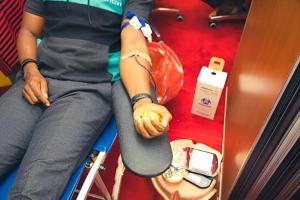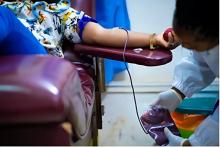Celebrating the Lifesaving Generosity of Blood Donors
Abuja, When Kemi Adesina donated blood for the first time, she did not expect a call of appreciation. A colleague had shared an urgent request for O-negative blood on WhatsApp. Knowing her blood type matched, Kemi volunteered.
“I did it because it felt like the right thing to do,” said Kemi, a 28-year-old office assistant.
At the blood bank, the technician explained that her O-negative blood was rare and urgently needed to treat a man injured in a bus accident.
“I hate needles,” she said. “But I’m glad I went through with it. It saved a life.”
“Donating blood regularly and voluntarily is an act of charity and kindness,” said Muhammad Abdulrahman, a regular donor who has given blood more than 30 times.
“There is always someone in need. That alone keeps me going,” he said.
Blood and blood products are essential for both routine medical care and emergencies. However, access to safe blood remains limited in many low- and middle-income countries. In Nigeria, only 30% of the national blood requirement is met, mainly through family replacement or paid donations. Voluntary, unpaid donations make up just 10% of the blood collected.
With a population of over 200 million, Nigeria needs about 1.8 million units of blood each year. Blood shortages often force families to turn to informal networks, and they face delays, unsafe blood, and high costs while waiting for transfusions.
Every year on 14 June, the world celebrates World Blood Donor Day to thank voluntary donors and raise awareness of the need for safe blood.
This year’s theme—"Give blood, give hope: together we save lives"—highlights the importance of solidarity in blood donation.
“Behind every donation is a story of hope and healing,” said Dr Alex Chimbaru, Officer-in-Charge, WHO Nigeria. “We especially urge young people to donate. Healthy youth are key to building a strong culture of voluntary blood donation.”
Dr Chimbaru, reiterated WHO’s commitment to supporting the government in strengthening national blood systems and expanding access to safe, quality-assured blood products. This includes improving donor education, retention, and recognition.
In Nigeria, WHO has partnered with the National Blood Service Agency (NBSA), the United Nations (UN) Clinic, and UNICEF to conduct annual blood drives among UN staff. These efforts aim to raise awareness and contribute to a safe and adequate blood supply in the country.
WHO also supports quality improvement of blood services in Nigeria through initiatives like the African Society for Blood Transfusion’s Stepwise Accreditation Programme, which helps ensure safe blood collection and use.
World Blood Donor Day, first established by WHO in 2004, continues to honour the selfless individuals who give blood freely to save lives.
Each blood donation can save up to three lives.




